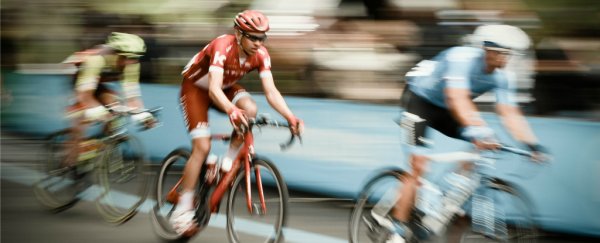To be a professional cyclist, one must have guts, microbiologist Lauren Peterson says, and she doesn't just mean that in the metaphorical sense.
Peterson, herself a pro endurance mountain biker, has discovered that the most elite athletes in the sport have a certain microbiome living in their intestines that allow them to perform better, and if you don't have it, well, there may soon be a way to get it…
"Call it poop doping if you must," Peterson told Bicycling magazine last week about her research.
Peterson, a research scientist at the Jackson Laboratory for Genomic Medicine in Farmington, Connecticut, heads up an initiative called the Athlete Microbiome Project, in which she compares stool samples of elite cyclists to amateur bikers.
Her findings strikingly shine a light on a handful of microorganisms that apparently separate the guts of elite athletes from average people.
The most important, perhaps, is Prevotella. Not typically found in American and European gut microbiomes, Prevotella is thought to play a role in enhancing muscle recovery.
"In my sampling, only half of cyclists have Prevotella, but top racers always have it," she told Bicycling. "It's not even in 10 percent of non-athletes."
Peterson reports she hosts Prevotella in her own gut - but not naturally. In fact, she might be the first case of "poop doping," thanks to a faecal transplant she administered herself three years ago. Her donor? Another elite athlete.
Peterson didn't decide on the faecal transplant solely to enhance her performance during her mountain bike races, but to cure a host of symptoms that have affected her since she was a child and contracted Lyme disease.
"I had no microbes to help me break down food, and I had picked up bugs in the lab where I was working because my system was so weak and susceptible," she told Bicycling.
But, she continued, "I couldn't find a doctor who could help me" since in the United States, faecal transplants are only performed to treat serious cases of Clostridium difficile, a disease that causes chronic diarrhoea. And so Peterson went rogue.
Peterson detailed her decision to perform the "risky" procedure on herself on the podcast "Nourish Balance Thrive" last year. She admitted to thinking it was a "bad idea" at first because if not done with proper screenings of both parties, it could worsen a person's problems.
But through chance, she came across a donor, an elite long-distance racer, who had his microbiome mapped and screened after a case of food poisoning, which showed he was otherwise healthy. So Peterson took antibiotics to wipe out her own gut bacteria and essentially performed a reverse enema.
"I just did it at home," she said of the February 2014 procedure. "It's not fun, but it's pretty basic."
Within a month, Peterson said, she began feeling better than she'd felt in years.
"I had more energy than I knew what to do with," she told the same podcast last year. "Like everything just changed."
Peterson, who's in her mid-30s, said before her transplant she was having trouble just training on her bike; just months later, she said she began winning pro races.
More importantly for her life's work, however, her own success with the faecal transplant gave her the idea to start the Athlete Microbiome Project, for which she rounded up 35 of her cycling friends, according to The Scientist magazine, to kick off her research.
Along with Prevotella, Peterson said she also identified another possibly performance-enhancing microbe called Methanobrevibacter archaea, which Peterson found to be more prevalent in the samples from elite athletes.
This bacteria's function is also opaque, however, Peterson told The Scientist, "it allows your entire gut microbiome to work more efficiently" by more effectively breaking down complex carbohydrates in the gut.
Peterson said it's too early to make any concrete conclusions about how the microbiome affects performance, but she's convinced there's enough evidence to suggest it does make a difference.
"What we're learning is going to change a lot for cyclists as well as the rest of the population," Petersen told Bicycling magazine.
"If you get tested and you're missing something, maybe in three years you'll be able to get it through a pill instead of a faecal transplant. We've got data that no one has ever seen before, and we're learning a lot. And I think I can say with confidence that bacterial doping .. is coming soon."
2017 © The Washington Post
This article was originally published by The Washington Post.
